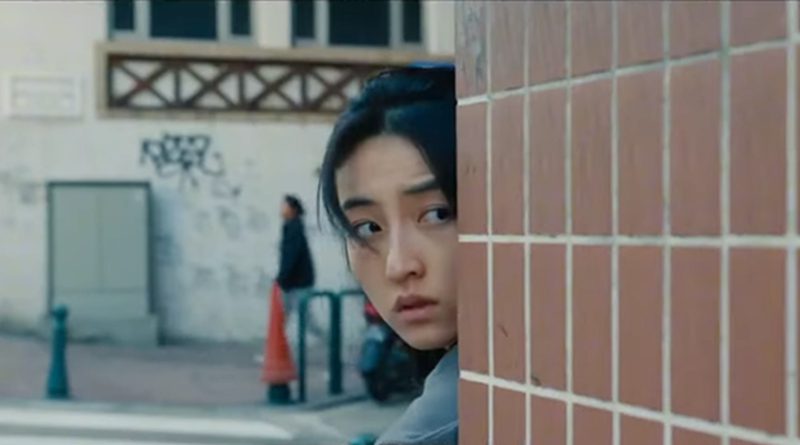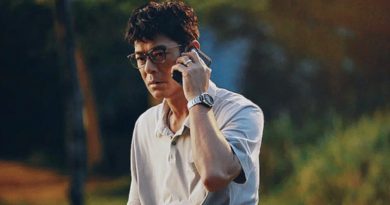The Shadow’s Edge 捕風追影 Review: A Return to Form Jackie Chan and a Scene-Stealing Tony Leung Ka-Fai Lead Larry Yang’s Gritty Action Thriller
The Shadow’s Edge marks the second time Jackie Chan collaborated with director Larry Yang after Ride On two years ago. Unlike the latter’s primary focus on a heartwarming dramedy that pays tribute to Chan’s career as an action star and a stuntman with some added fight scenes, The Shadow’s Edge is a different beast altogether. The latest movie sees Chan returning to his gritty action-movie territory, his first since The Foreigner back in 2017.
A remake of Yau Nai-Hoi’s Eye in the Sky with several key elements intact, this Macau-set action thriller begins with Fu Lung-Sang a.k.a. Shadow (Tony Leung Ka-Fai), who leads his elusive gang of high-tech thieves, notably twin brothers Hei Wong and Hei Mong (both played by Ci Sha), whose respective skills are a professional assassin and a hacker. They have successfully outsmarted the Macau Judiciary Police’s advanced AI tracking system, nicknamed Skyeye and Spice Girl, and managed to escape with a hefty amount of cryptocurrency.
This leads the police to enlist retired officer and surveillance specialist, Wong Tak-Chung (Jackie Chan), to help track down Fu and his gang, who have since gone missing after the heist. Wong soon takes Ho Chiu-Guo a.k.a Guoguo (Zhang Zifeng) under his wing, and handpicks the rest of the qualified young police officers to train them in the old-school surveillance method. Wong used to partner with Ho’s late father (Yu Rongguang), who was killed during a botched stakeout. Ho blames him for the death of her father, and his comeback to the police force doesn’t sit well with her at first.
Beginning in the 2010s, most of Jackie’s movies from 1911 to Bleeding Steel, Vanguard, as well as last year’s double whammy of A Legend and Panda Plan, were either mediocre or outright disappointments. His previous collaboration with Yang in Ride On was at least a decent entry, proving there’s still a glimmer of hope left for the veteran action star.
Now at his 71 years of age, Jackie shows no sign of slowing down, even willing to go as far as playing a role that leans more on violence and brutality — something that we have hardly seen him engage in such a physical intensity for years. This is especially true during his climactic fight against Tony Leung Ka-Fai’s knife-wielding criminal mastermind in the cramped teahouse. A significantly bloody fight, to be exact, which also turns out to be one of the most violent hand-to-hand combats ever seen in a Jackie Chan movie.
Interestingly, the otherwise non-action star Leung surprises me with his better-than-expected physically demanding performance that requires him to master the knifing skill, which reportedly took him a year of intense training. At one point, there’s even a scene where he makes good use of his knife to single-handedly kill several hired thugs. His no-nonsense presence shows that he still has what it takes to play a formidable antagonist, and his long-awaited reunion with Jackie displays better results than their last on-screen appearances in The Myth twenty years ago.

The tension between the two screen veterans extends beyond their action-oriented encounter as Wong and Fu first cross paths in the elevator, relying on their astute thinking and quick reflexes upon exchanging words while maintaining composure to avoid suspicion. An extended scene where Wong invites Fu over for a home-cooked dinner is a masterclass of build-up anticipation and suspense, making you wonder whether either of them will make a move beyond their seemingly casual get-together. It was one of the best scenes in The Shadow’s Edge, showcasing Yang’s deft handling in raising stakes whenever the moment calls for it.
While Leung steals most of the show here, Jackie deserves equal mention for balancing his act between playing a lightweight and dramatic performance without succumbing to overacting. He may have been a lot older, and his agility is not as nimble as it used to be. Yang understands this and Su Hang, who leads the action choreography, tailors a martial arts move which ideally fits Jackie’s current age and strength, resulting in a combination of Hapkido-style close quarters combat and joint manipulation that somewhat reminds of then-64-year-old Sammo Hung in The Bodyguard a.k.a. My Beloved Bodyguard back in 2016.
Such a move might alienate the fans who have grown accustomed to Jackie’s more acrobatic style of kung fu, and even though we still get to see some of his familiar moves, notably during his fight scene against two of Fu’s quick-moving team members in the laundromat. While the acting showcase belongs to Jackie and Leung, the younger stars, including Zhang Zifeng and Ci Sha, also deserve praise for bringing in their solid support.
As for Yang, his assured direction has grown by leaps and bounds since his last outing in Ride On. His love for Hong Kong cinema is evident here, which can be seen during the visceral action scenes through the predominant use of dynamic camerawork, even though his penchant for hyperactive editing could have used some slowing down to allow the viewers to fully immerse themselves in the elaborate choreography. The Shadow’s Edge may have clocked in a longer-than-expected 141 minutes, but Yang manages to maintain a consistent pace.
Even when the movie takes a breather to make way for character developments and backstories, Yang, who also wrote the screenplay, doesn’t overwhelm them to the point that it loses momentum. The runtime just whizzes by with all the constant moving bits and pieces that keep you engaged from start to end. Yang’s screenplay addresses the adaptability of traditional vs modernity, as seen from the perspectives of Wong and Fu’s respective ways of managing their professions in an old-school way.
The two may have been from different sides of the law — one’s a law enforcer, the other’s a criminal — but their fundamental ideologies remain the same: Both of them are firm believers that traditional methods are far from obsolete, even in the age of a technologically-driven world. Remember to stick around for the outtakes and yes, a post-credits scene. The Shadow’s Edge is no doubt a return to form for Jackie Chan, easily one of his best action movies in a long while.





